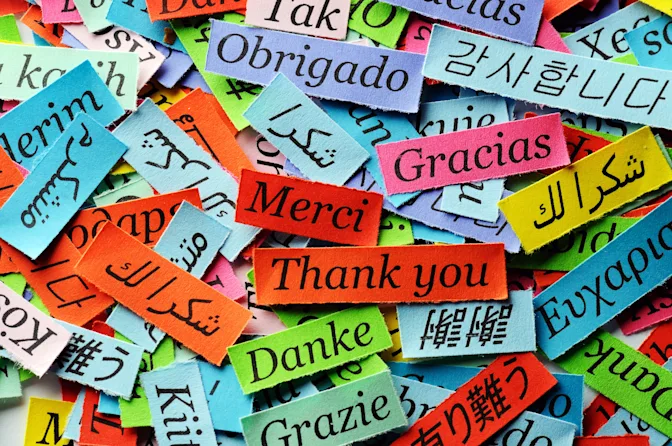
Are These Really the World's Most Spoken Languages?
Languages are the vibrant threads that weave together the tapestry of human experience. Language informs everything from our culture to our relationships, which is why we are diving into the top 10 most spoken languages and exploring some interesting insights into each of them.

There is not really one hard and fast way to assign hard data to any of these languages. According to Babbel, "What constitutes a language or a dialect is hotly contested stuff. More troubling is the fact that what we refer to simply as 'Chinese' is actually a whole family of languages conveniently lumped into a single category. 'Hindi' is also used as a catch-all term to cover numerous dialects and sub-dialects. We haven't even yet acknowledged the unreliability of data sources, collected at different times by different institutions. The numbers below are taken compiled by Ethnologue, which is widely considered the most complete language data source currently in existence."
With this in mind, let's jump into the list.
1. Mandarin Chinese
The undisputed heavyweight champion of languages, Mandarin Chinese boasts over 1.3 billion speakers worldwide. This tonal language, where pitch can change the meaning of a word, is a fascinating puzzle for learners. Interestingly, Mandarin Chinese has very few grammatical markers, relying on word order to convey meaning.
2. Hindi
With over 600 million speakers, Hindi is the primary language of India, a country rich in culture and history. This language is part of the Indo-European family, sharing some common roots with English. Hindi is written in the Devanagari script, a complex writing system with unique characteristics.
3. Spanish
Spoken by over 500 million people globally, Spanish is the official language in over 20 countries. Did you know that Spanish is the second most used language on the internet? Next time you're browsing, you might be surprised by the amount of content available in Spanish.
4. Arabic
Spoken by over 422 million people, Arabic is the official language of 22 countries across the Middle East and North Africa. The language of the Quran is known for its poetic beauty and rich literary heritage. Arabic has only three vowel sounds, making it quite different from many European languages.
5. English
The language of Shakespeare and global commerce, an estimated 380 million native speakers speak English worldwide. Its influence can be felt in almost every corner of the world, with countless words borrowed from English popping up in other languages. English is the official language of over 67 countries, making it the most widely used official language.
6. French
The language of love and haute couture, over 274 million people speaks French worldwide. This Romance language, derived from Latin, is known for its elegance and sophistication. French is the official language in over 30 countries across the globe, a legacy of France's colonial past.
7. Bengali
The official language of Bangladesh and spoken by over 260 million people globally, this language is known for its rich literary tradition and unique rhythmic qualities. Did you know? Bengali is written in its own script, which is derived from an ancient Indian script called Brahmi.
8. Russian
With over 250 million speakers, Russian is the most spoken Slavic language globally. This language is known for its complex grammar system and rich literary tradition. The Russian alphabet is Cyrillic, which bears some resemblance to the Greek alphabet but has additional letters.
9. Portuguese
Portuguese, spoken by over 230 million people worldwide, has roots in Latin. Portuguese is the official language of Portugal, Brazil, and several African countries, reflecting its colonial past. There are actually two main varieties of Portuguese spoken, European Portuguese and Brazilian Portuguese, which have some distinct differences in pronunciation and vocabulary.
10. Japanese
This fascinating language, spoken by over 125 million people, is unique in its writing system. Japanese combines three different scripts: Kanji (adopted from Chinese characters), Hiragana, and Katakana. Something we learned: Japanese is not technically an Indo-European language, and its origins are still debated by linguists.

This list is just the tip of the iceberg when it comes to the amazing diversity of languages around the world. Each language gives us a special insight into a culture's history, traditions, and way of thinking. So, the next time you travel or meet someone speaking a different language, take a moment to embrace the diversity of communication around you.
References::The 10 Most Spoken Languages In The World| Ethnologue
























